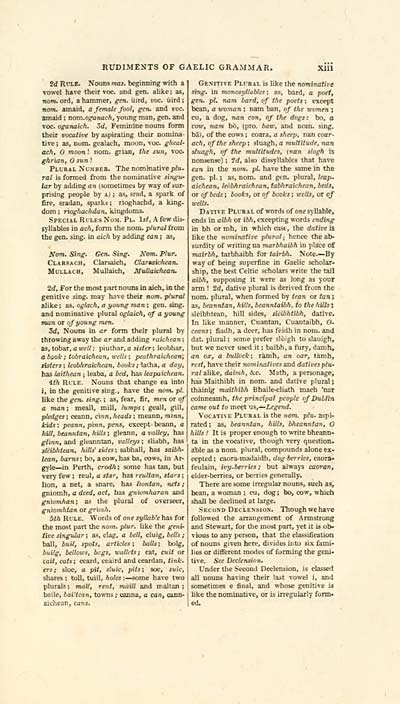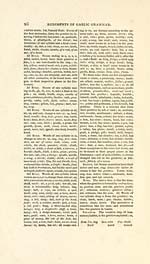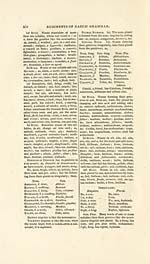Download files
Complete book:
Individual page:
Thumbnail gallery: Grid view | List view

RUDIMENTS OF GAELIC GRAMMAR.
XIU
5d Rule. Nouns mat. beginning with a
vowel have their roc. and gen. alike ; as,
nom. ord, a hammer, gm. iiird, roc. iiird ;
nom, amaid, a female foo/, geiu and voc.
amaid ; nom.oganach, young man, gen. and
voc. oganaich. od. Feminine nouns form
their vocative by aspirating their nomina-
tive; as, nom. gealach, moon, voc. gheal-
ach, moon ! nom. grian, the sun, voc
ghrian, fun '.
Plural Number. The nominative plu.
rat is formed from the nominative singxi-
lar by adding an (sometimes by way of sur-
prising people by a) ; as, srad, a spark of
fire, sradan, sparks ; rioghachd, a king-
dom ; riogfiachdan, kingdoms.
Special Riles Nom. Pl. Isf, A few dis-
syllables in ach, form the nom. plural from
the gen. sing, in aich by adding ean; as,
Ifom. Sing. Geru Sing. Kom. Plur.
Clarsacjh, Clarsaich, Clariaichean.
Mullach, Mullaich, MvUaichean.
2d, For the most part nouns in aich, in the
genitive sing, may have their nom. plural
alike ; as, ogtach, a young man ; gen. sing.
and nominative plural oglaich, of a young
man or of young men.
3d, Nouns in ar form their plural by
throwing away the ar and adding raichean ;
as, lobar, a well ; piulhar, a sister ; leobhar,
a book; tobraichean, wells; peathraichean,
listers •■, leobhraichean, books; latha, a day,
has laithean ; leaba, a bed, has leapaicliean.
ith Rile. Nouns that change ea into
i, in the genitive sing., have the nom. pl.
like the gen. sing. ; as, fear, fir, men or of
a man ; meall, mill, lumps ; geall, gill,
pledges; ceann, cmn, heads; meann, minn,
kids ; peann, p'lnn, pens, except beann, a
hill, beanntan, hills ; gleann, a valley, has
glinn, and gleanntan, valleys ; sliabh, has
slèibhtean, hill^ sides; sabhaW, has saibh-
lean, barns; bo, a cow, has ba, cows, in Ar-
gyle — in Perth, crodh; some has tan, but
very few ; reul, a star, has reultan, stars;
lion, a net, a snare, has liontan, nets ;
gniomh, a deed, act, has gnwmharan and
gn'wmhan; as the plural of overseer,
gniomhtan or grimh.
5th Rule. Words of one syUab'e has for
the most part the nom. plur. like the geni-
tive singular \ as, clag, a hell, e\u\g, bells ;
ball, bull, spots, articles; balls; bolg,
builg, bellows, begs, wallets; cat, cuit or
cait, cats; ceard, ceàird and ceardan, tink-
ers ; sloe, a pit, sluic, pits ; soc, suic,
shares ; toll, tuill, holes ;— some have two
plurals; mall, rent, màill and maltan ;
baile, lai'tean, towns; canna, a can, cann-
aichean, cans.
Genitive Plural is like the nominative
sing, in monosyllables ; as, bard, a poet,
gen. pl. nam bard, of the poets ; except
bean, a woman ; nam ban, of the women ;
cu, a dog, nan con, of the dogs: bo, a
cow, nam bo, (pro. baw, and nom. sing,
ba), of the cows ; coara, a sheep, nan coar-
ach, of the sheep ; sluagh, a multitude, ruin
sluagh, nf the multitudes, (nan slogh is
nonsense) ; ?d, also dissyllables that have
ean in the nom. pl. have the same in the
gen. pl. ; as, nom. and gen. plural, leap,
aichean, leobhraichean, tabhraichean, beds,
or of beds ; books, or of books ; wells, or of
wells.
Dative PLiTiALof words of one syllable,
ends in aibh or ibh, excepting words ending
in bh or mh, in which cast, the dative is
like the nominative plural; hence the ab-
surdity of writing na marbhaibh in place of
mairbh, tarbhaibh for tairbh. Note.— By
way of being superfine in Gaelic scholar-
ship, the best Celtic scholars write the tail
aibh, supposing it were as long as your
arm ! 2rf, dative plural is derived from the
nom. plural, when formed by lean or tan ;
as, beanntan, hills, beanntaibh, to the hills I
sleibhtean, hill sides, sUibhtibh, dative.
In like manner, Cuantan, Cuantaibh, O-
ceans ; fiadh, a deer, has feidh in nom. and
dat. plural ; some prefer sloigh to slauigh,
but we never used it ; baibh, a fury, damh,
an ox, a bullock; ràmh, an oar, tamh,
rest, have their nominatives and datives plU'
ral alike, daimh, &c. Math, a personage,
has Maithibh in nom. and dative plural ;
thàinig maithibh Bhaile-cliath mach 'nar
coinneamh, the principal people of Dublin
came out to meet us, — Legend.
Vocative Plural is the nom. plu. aspi-
rated ; as, beanntan, hills, bheanntan,
hills .' It is proper enough to write bheann-
ta in the vocative, though very question,
able as a nom. plural, compounds alone ex-
cepted ; caora-madaidh, dog-berries, caora-
feulain, ivy-berries; but always caoran,
elder-berries, or berries generally.
There are some irregular nouns, such as,
bean, a woman ; cu, dog; bo, cow, which
shall be declined at large.
Second Declexsiox. Thoughwehave
followed the arrangement of Armstrong
and Stewart, for the most part, yet it is ob-
vious to any person, that the classification
of nouns given here, divides into six fami-
lies or different modes of forming the geni-
tive. See Declension.
Under the Second Declension, is classed
aU nouns having their last vowel i, and
sometimes e final, and whose genitive is
like the nominative, or is irregularly form-
ed.
XIU
5d Rule. Nouns mat. beginning with a
vowel have their roc. and gen. alike ; as,
nom. ord, a hammer, gm. iiird, roc. iiird ;
nom, amaid, a female foo/, geiu and voc.
amaid ; nom.oganach, young man, gen. and
voc. oganaich. od. Feminine nouns form
their vocative by aspirating their nomina-
tive; as, nom. gealach, moon, voc. gheal-
ach, moon ! nom. grian, the sun, voc
ghrian, fun '.
Plural Number. The nominative plu.
rat is formed from the nominative singxi-
lar by adding an (sometimes by way of sur-
prising people by a) ; as, srad, a spark of
fire, sradan, sparks ; rioghachd, a king-
dom ; riogfiachdan, kingdoms.
Special Riles Nom. Pl. Isf, A few dis-
syllables in ach, form the nom. plural from
the gen. sing, in aich by adding ean; as,
Ifom. Sing. Geru Sing. Kom. Plur.
Clarsacjh, Clarsaich, Clariaichean.
Mullach, Mullaich, MvUaichean.
2d, For the most part nouns in aich, in the
genitive sing, may have their nom. plural
alike ; as, ogtach, a young man ; gen. sing.
and nominative plural oglaich, of a young
man or of young men.
3d, Nouns in ar form their plural by
throwing away the ar and adding raichean ;
as, lobar, a well ; piulhar, a sister ; leobhar,
a book; tobraichean, wells; peathraichean,
listers •■, leobhraichean, books; latha, a day,
has laithean ; leaba, a bed, has leapaicliean.
ith Rile. Nouns that change ea into
i, in the genitive sing., have the nom. pl.
like the gen. sing. ; as, fear, fir, men or of
a man ; meall, mill, lumps ; geall, gill,
pledges; ceann, cmn, heads; meann, minn,
kids ; peann, p'lnn, pens, except beann, a
hill, beanntan, hills ; gleann, a valley, has
glinn, and gleanntan, valleys ; sliabh, has
slèibhtean, hill^ sides; sabhaW, has saibh-
lean, barns; bo, a cow, has ba, cows, in Ar-
gyle — in Perth, crodh; some has tan, but
very few ; reul, a star, has reultan, stars;
lion, a net, a snare, has liontan, nets ;
gniomh, a deed, act, has gnwmharan and
gn'wmhan; as the plural of overseer,
gniomhtan or grimh.
5th Rule. Words of one syUab'e has for
the most part the nom. plur. like the geni-
tive singular \ as, clag, a hell, e\u\g, bells ;
ball, bull, spots, articles; balls; bolg,
builg, bellows, begs, wallets; cat, cuit or
cait, cats; ceard, ceàird and ceardan, tink-
ers ; sloe, a pit, sluic, pits ; soc, suic,
shares ; toll, tuill, holes ;— some have two
plurals; mall, rent, màill and maltan ;
baile, lai'tean, towns; canna, a can, cann-
aichean, cans.
Genitive Plural is like the nominative
sing, in monosyllables ; as, bard, a poet,
gen. pl. nam bard, of the poets ; except
bean, a woman ; nam ban, of the women ;
cu, a dog, nan con, of the dogs: bo, a
cow, nam bo, (pro. baw, and nom. sing,
ba), of the cows ; coara, a sheep, nan coar-
ach, of the sheep ; sluagh, a multitude, ruin
sluagh, nf the multitudes, (nan slogh is
nonsense) ; ?d, also dissyllables that have
ean in the nom. pl. have the same in the
gen. pl. ; as, nom. and gen. plural, leap,
aichean, leobhraichean, tabhraichean, beds,
or of beds ; books, or of books ; wells, or of
wells.
Dative PLiTiALof words of one syllable,
ends in aibh or ibh, excepting words ending
in bh or mh, in which cast, the dative is
like the nominative plural; hence the ab-
surdity of writing na marbhaibh in place of
mairbh, tarbhaibh for tairbh. Note.— By
way of being superfine in Gaelic scholar-
ship, the best Celtic scholars write the tail
aibh, supposing it were as long as your
arm ! 2rf, dative plural is derived from the
nom. plural, when formed by lean or tan ;
as, beanntan, hills, beanntaibh, to the hills I
sleibhtean, hill sides, sUibhtibh, dative.
In like manner, Cuantan, Cuantaibh, O-
ceans ; fiadh, a deer, has feidh in nom. and
dat. plural ; some prefer sloigh to slauigh,
but we never used it ; baibh, a fury, damh,
an ox, a bullock; ràmh, an oar, tamh,
rest, have their nominatives and datives plU'
ral alike, daimh, &c. Math, a personage,
has Maithibh in nom. and dative plural ;
thàinig maithibh Bhaile-cliath mach 'nar
coinneamh, the principal people of Dublin
came out to meet us, — Legend.
Vocative Plural is the nom. plu. aspi-
rated ; as, beanntan, hills, bheanntan,
hills .' It is proper enough to write bheann-
ta in the vocative, though very question,
able as a nom. plural, compounds alone ex-
cepted ; caora-madaidh, dog-berries, caora-
feulain, ivy-berries; but always caoran,
elder-berries, or berries generally.
There are some irregular nouns, such as,
bean, a woman ; cu, dog; bo, cow, which
shall be declined at large.
Second Declexsiox. Thoughwehave
followed the arrangement of Armstrong
and Stewart, for the most part, yet it is ob-
vious to any person, that the classification
of nouns given here, divides into six fami-
lies or different modes of forming the geni-
tive. See Declension.
Under the Second Declension, is classed
aU nouns having their last vowel i, and
sometimes e final, and whose genitive is
like the nominative, or is irregularly form-
ed.
Set display mode to: Large image | Transcription
Images and transcriptions on this page, including medium image downloads, may be used under the Creative Commons Attribution 4.0 International Licence unless otherwise stated. ![]()
| Early Gaelic Book Collections > Blair Collection > Argyleshire pronouncing Gaelic dictionary > (17) |
|---|
| Permanent URL | https://digital.nls.uk/76240093 |
|---|
| Description | A selection of books from a collection of more than 500 titles, mostly on religious and literary topics. Also includes some material dealing with other Celtic languages and societies. Collection created towards the end of the 19th century by Lady Evelyn Stewart Murray. |
|---|
| Description | Selected items from five 'Special and Named Printed Collections'. Includes books in Gaelic and other Celtic languages, works about the Gaels, their languages, literature, culture and history. |
|---|

